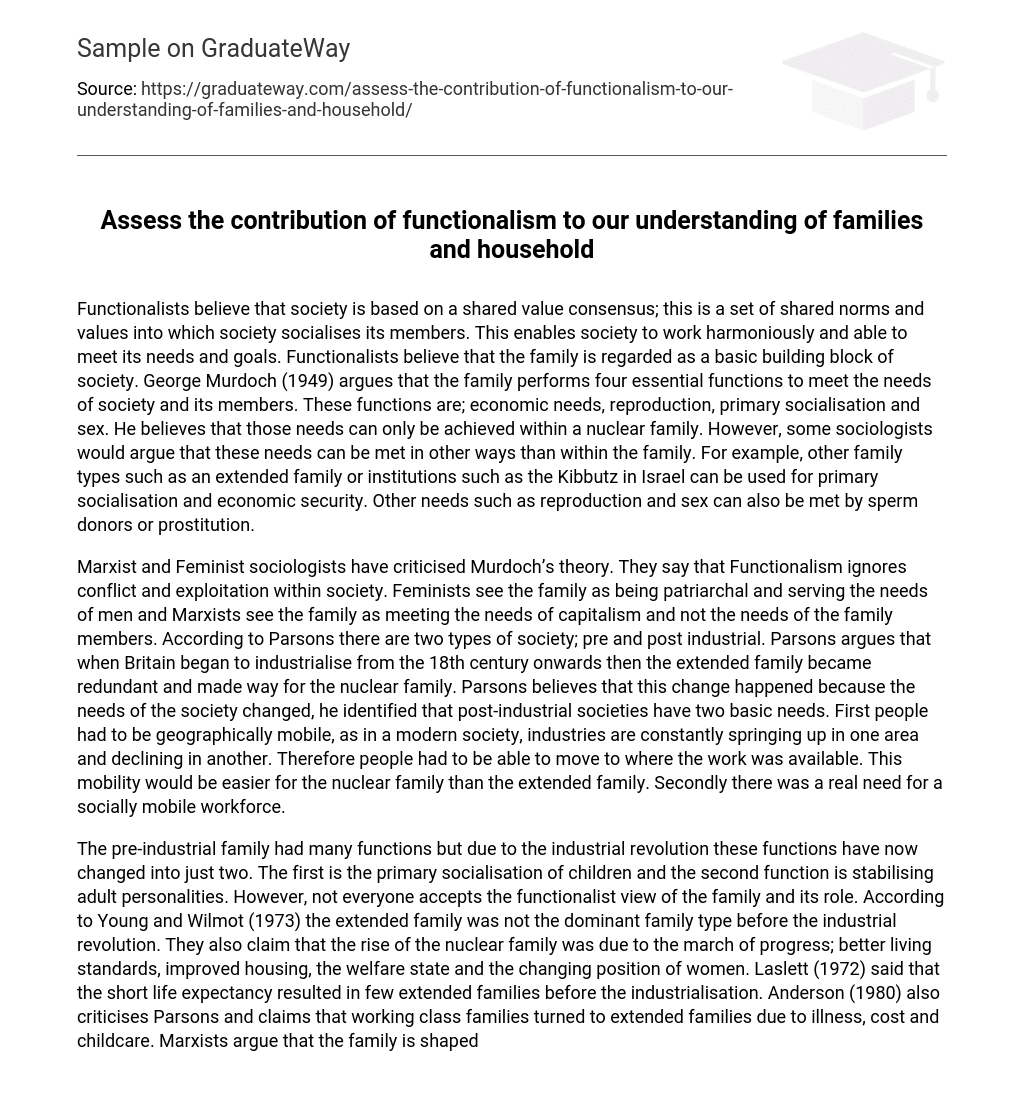Functionalists contend that society operates on the basis of a collective agreement on values, known as a shared value consensus. This forms a set of shared norms and values that society imparts to its members through socialization. This collective understanding enables society to function harmoniously and fulfill its needs and objectives. Functionalists consider the family as a fundamental unit of society. According to George Murdoch (1949), the family serves four crucial functions in meeting both societal and individual needs. These functions encompass economic requirements, reproduction, primary socialization, and sexual activities. Murdoch asserts that these needs can only be fulfilled within a nuclear family structure. Nevertheless, some sociologists argue that alternative family types, such as the extended family, or institutions like the Kibbutz in Israel, can also fulfill primary socialization and economic security needs. Additionally, reproductive and sexual needs can be met through methods such as sperm donors or engaging in prostitution.
Marxist and Feminist sociologists have criticized Murdoch’s theory for overlooking conflict and exploitation within society. According to them, Functionalism disregards the fact that the family serves the needs of men in a patriarchal system and meets the needs of capitalism rather than prioritizing the needs of family members. Parsons identified two types of society: pre-industrial and post-industrial. He argues that as Britain started industrializing from the 18th century onwards, the extended family became unnecessary and was replaced by the nuclear family. Parsons believes that this shift occurred because society’s needs changed. He observed that post-industrial societies have two essential requirements. Firstly, people had to be geographically mobile as industries constantly emerged in one area and declined in another. Therefore, individuals needed to be able to relocate to areas with available job opportunities. The nuclear family facilitated this mobility more easily than the extended family. Secondly, there was a significant demand for a socially mobile workforce.
The functions of the pre-industrial family have changed into two main functions due to the industrial revolution. The first function is the primary socialisation of children, while the second function is stabilising adult personalities. However, not everyone agrees with the functionalist perspective on the family and its role. According to Young and Wilmot (1973), the dominant family type before the industrial revolution was not the extended family. They argue that the rise of the nuclear family was driven by progress, such as improved living standards, housing, the welfare state, and changes in women’s roles. Laslett (1972) suggests that the industrialisation resulted in fewer extended families due to a shorter life expectancy. Anderson (1980) criticises Parsons and claims that working class families turned to extended families because of illness, cost, and childcare. According to Marxists, the family is influenced by those who own the means of production (bourgeoisie). They argue that the family serves ideological functions that perpetuate inequality between social classes and convinces people to accept capitalism as a fair system. The family plays a role in socialising children to believe in the fairness of societal inequality and hierarchy.
However, Marxists tend to overlook alternative family types and uphold the nuclear family as the most dominant in society. Feminists critique the Marxist perspective on the family, arguing that it places excessive importance on class conflict while disregarding gender inequalities. Additionally, Functionalists argue that both Marxists and Feminists neglect the various roles that families fulfill, such as providing support and fostering intimacy. In contemporary Britain, there exists a wide range of family types, yet Marxist and Feminist approaches assume that families and their members are manipulated to serve specific functions like supplying a workforce or oppressing a gender. Another criticism of structuralist theories comes from interpretivist sociologists who contend that individuals have autonomy to make choices and may opt not to form a traditional family unit. Couples, for instance, may choose not to have children, resulting in an increasingly diverse array of family types.





